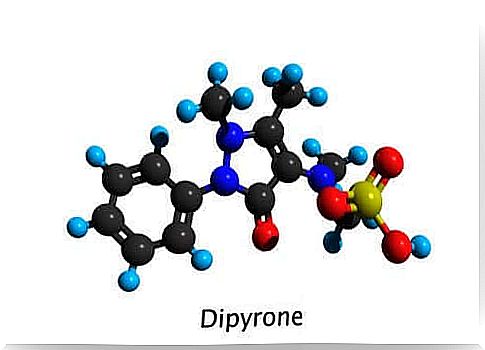Novalgin: What Is It For?
Novalgin, which consists of metamizole or dipyrone, has an analgesic and antipyretic effect. Find out more about this controversial drug!

Novalgin is a drug that consists of metamizole or dipyrone. It belongs to the group of pyrazolones and has an analgesic and fever-lowering effect.
However, Novalgin also has anti-inflammatory and antispasmodic properties, albeit with less effect. Below you will learn more about various properties of this medicine.
How does Novalgin work?

Just like other drugs in the group , dipyrone or metamizole inhibits the effect of cyclooxygenase. As a result, it inhibits the production of prostaglandins due to its pain relieving and antipyretic properties.
Although its metabolites are also active and block prostaglandin synthesis, its anti-inflammatory effects are not important.
Metamizole, on the other hand, relaxes and reduces the smooth muscle activity of the gastrointestinal tract and uterus. Dipyrone or metamizole can be administered orally, intramuscularly or intravenously.
What is it used for?
This drug is used to treat acute, moderate, or intense post-operative or post-traumatic pain and painful colic or tumor pain. It is also used for a high fever that does not respond to other measures or other antipyretic drugs.
Dosage and contraindications

The dose used will depend on the pain reliever effect desired and the patient’s condition. The usual oral dose for adults is usually between 8 and 16 mg / kg body weight.
There is an increased risk of anaphylactic reactions with parenteral administration. For the treatment of fever in children, a dose of 10 mg / kg body weight is usually sufficient.
The analgesic and antipyretic effects set in within 30 to 60 minutes of administration. The parenteral dose of more than 1 g Dipyrone should be carefully analyzed for the risk of hypotension.
Another piece of advice to consider is that diabetics are better off using tablets or drops instead of syrup. In addition, one must avoid high doses of metamizole in patients with kidney or liver failure.
However, due to contraindications , Novalgin must not be used in the following cases:
- Hypersensitivity to pyrazolones
- Renal or hepatic insufficiency, both acute and chronic
- Blood dyscrasia
- Active gastric ulcer
- Heart failure
- During pregnancy and breastfeeding
A haematological examination is also recommended before and regularly during treatment.
Side effects
Dipyrone or metamizole is a pain reliever that has been withdrawn from the market in many countries due to its toxic effects, especially in connection with agranulocytosis.
Information is available to suggest that the use of these active substances leads to severe hypersensitivity reactions. The following are particularly noteworthy:
- Agranulocytosis: Although rare, it is a serious and sometimes irreversible reaction. However, although its origin is unknown, it is considered to be an immunological reaction.
- Shock: This is another essential hypersensitivity reaction. It manifests itself as itching, cold sweats, drowsiness, nausea, shortness of breath and skin discoloration.
Agranulocytosis and shock endanger the patient’s life and require treatment to be discontinued. Immediate medical treatment is required in these cases.
In addition , hypersensitive skin reactions can occur, especially on the mucous membranes of the eyes and in the nasopharynx. Other reactions that metamizole can cause are leukopenia, thrombocytopenia, and hemolytic anemia.
Novalgin in Germany

In many English-speaking countries in particular, the approval of metamizole was withdrawn because of the serious side effects. In German-speaking countries, the drug requires a prescription, but is approved.
For example, the Spanish Agency for Medicines and Health Products gives healthcare professionals the following recommendations:
- Use metamizole only for short-term treatments, maximum 7 days.
- It recommends its use only in cases that correspond to the authorized indications and the minimum effective dosages .
However, if longer treatment is required, regular blood tests (including differential blood counts ) should be done. Metamizole should not be used in patients who cannot be monitored.
Conclusion
It is recommended that a detailed medical history be obtained before prescribing metamizole. In this way, use in patients with a history of hypersensitive or haematological reactions to this drug can be avoided.









